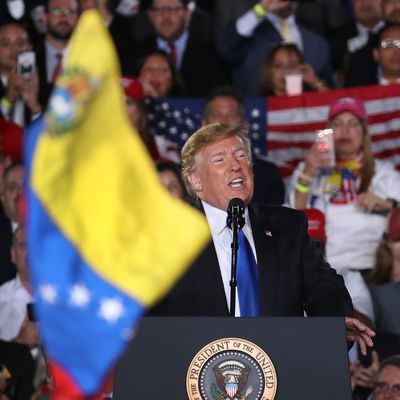
If you know your political history, you may well know that the political behavior of Florida’s Latino population has long been distinctive from that in other parts of the country. This has mostly been due to the size and influence of the state’s Cuban-American population, in which fiercely anti-communist emigres and (and, increasingly, the descendants of emigres) figure prominently. To make a long and complex story short, the pro-Republican leaning of Florida Latinos has been more or less steadily declining in this century thanks to a combination of factors, notably a heavy influx of Democratic-leaning citizens from Puerto Rico, and some generational change among South Florida’s Cuban-American population.
In 2016, Hillary Clinton did nearly as well among Florida Latinos (beating Donald Trump 62/35, according to exit polls) as she did among Latinos nationally (which she won 66/28), even though Trump carried Cuban-Americans in the state by a comfortable 54/41 margin. After nearly three more years of nativist stylings from Trump, It’s not surprising his reelection campaign is very worried about any further erosion of support among Latino Floridians. There is no plausible road to a second Trump term that doesn’t include again carrying the Sunshine State’s 29 electoral votes.
Unsurprisingly, the Trump administration and its local allies are counting on the president’s bellicose attitude toward the failed petro-socialist Maduro regime in Venezuela (and his support for rival leader Juan Guaido) to remind Cuban-Americans of their heritage and to curry favor with a growing Venezuelan-American emigre population, along with recent immigrants from other South American countries affected by the crisis in Caracas. As Jonathan Blitzer explains, we’re now talking about a lot of voters in this latter category:
Only a small percentage of the recently arrived Venezuelans are eligible to vote, but many Latin Americans in Florida see the Venezuelan government as the nexus of the region’s worst problems. The repressive socialist leaders in Cuba and Nicaragua depend on Venezuela for oil and for political support. Colombia, which borders Venezuela, has taken in more than a million refugees. “If you solve the Venezuela problem, you get three for the price of one,” a state Republican operative told me. “You’ll make the Colombians, Nicaraguans, and Cubans in Florida very happy …”
In and around Miami, seven hundred thousand Cubans are eligible to vote, along with a hundred and sixty thousand Colombians, eighty thousand Nicaraguans, and some fifty thousand Venezuelans.
It’s not, moreover, just a matter of voters who immigrated (or whose parents and grandparents or great-grandparents immigrated) from countries where Maduro’s misrule (or fallout from the struggle for control of Venezuela) is wreaking havoc. As the aggressive questioning of Democratic presidential candidates in last week’s debate in Houston by Univision moderator Jorge Ramos showed, interest in or knowledge of the situation in Venezuela may be taken to symbolize concern for Latin America generally.
Republicans showed a renewed commitment to Florida Latinos and particularly the Cuban-American constituency in the 2018 midterms, where the party’s ability to buck a national pro-Democratic trend in razor-thin Senate and gubernatorial contests depended on strong performances in and near Little Havana, as Blitzer notes:
In 2018, across Miami-Dade County, [gubernatorial candidate Ron] DeSantis and his predecessor, Rick Scott, who ran for Senate, outperformed Trump, mostly because of their strong showing among Cuban-Americans; turnout among previously registered voters, who are often older and more likely to vote Republican, outpaced new registrations. Andrade told me that older Cuban-Americans had been at the center of DeSantis’s strategy in Miami-Dade, where he won seventy per cent of the Cuban vote. According to polling by a team at F.I.U., Cuban-Americans who came to the U.S. before 1980 supported DeSantis over his Democratic opponent, Andrew Gillum, by a margin of eighty-four per cent to fifteen per cent.
It’s probably no accident that since then the Trump administration’s antagonism toward Latin American socialism has intensified, with heightened sanctions against Maduro and escalating regime-change talk spearheaded by former National Security Adviser John Bolton. But there is a distinct risk of overreaching by an administration that often believes in rattling rather than deploying sabers, and it’s unclear how Bolton’s firing will affect the policy and politics of Trump’s approach to Latin American issues. Unlike Cuban-Americans (who benefited from years of customized asylum status), or Puerto Ricans (who are already U.S. citizens), South American immigrants are affected by Trump’s nativist rhetoric and policies. Even his appeal to Venezuelan immigrants has been significantly undermined by his administration’s hostility to Temporary Protected Status (a special asylum category designed for people fleeing violence and political oppression) for Venezuelans and other Latin American immigrant communities.
Between DeSantis and Scott and the perceived Florida Republican quarterback for Latin American policy, Marco Rubio, it’s quite certain that Trump will hear regularly about what it will take to hang onto a decent share of the Latino vote in 2020. And to the extent that Trump won’t bend on immigration issues that may irritate Latinos there and elsewhere, there is reason to fear that he will try to make up for it with even more talk of military adventurism in the region.






























